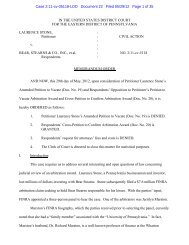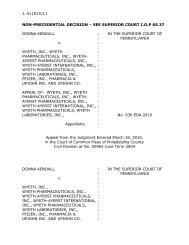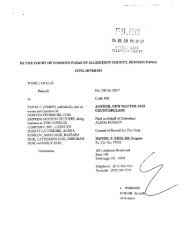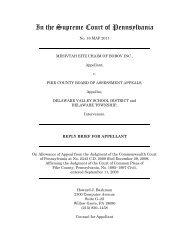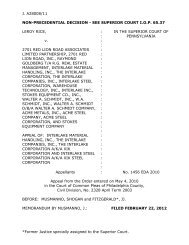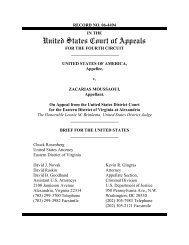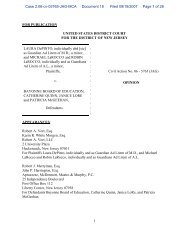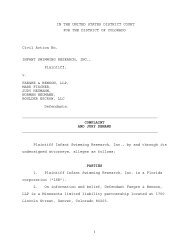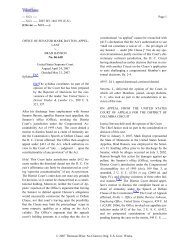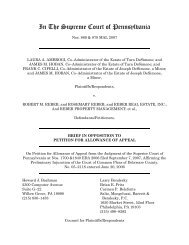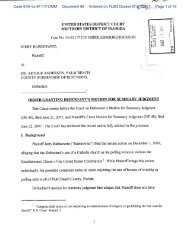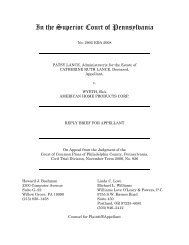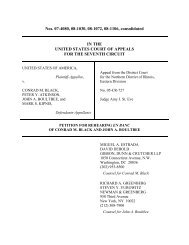In the Superior Court of Pennsylvania - How Appealing
In the Superior Court of Pennsylvania - How Appealing
In the Superior Court of Pennsylvania - How Appealing
You also want an ePaper? Increase the reach of your titles
YUMPU automatically turns print PDFs into web optimized ePapers that Google loves.
Moreover, <strong>the</strong> <strong>Superior</strong> <strong>Court</strong>’s reversal <strong>of</strong> Judge Tereshko’s legally incorrect<br />
entry <strong>of</strong> summary judgment in <strong>the</strong>se fourteen consolidated cases on statute <strong>of</strong><br />
limitations grounds is consistent with how courts in o<strong>the</strong>r jurisdictions have been<br />
ruling on this very same issue in hormone <strong>the</strong>rapy cases.<br />
<strong>In</strong> <strong>the</strong> federal multi–district litigation pending before U.S. District Judge<br />
Wm. R. Wilson, Jr. in <strong>the</strong> Eastern District <strong>of</strong> Arkansas, Judge Wilson has refused to<br />
grant summary judgment on statute <strong>of</strong> limitations grounds in cases where <strong>the</strong><br />
plaintiff has sued within <strong>the</strong> applicable statute <strong>of</strong> limitations commencing when <strong>the</strong><br />
results <strong>of</strong> <strong>the</strong> WHI study became public on July 9, 2002. See, e.g., Scroggin v. Wyeth,<br />
2007 WL 3228125, at *1 (E.D. Ark. Nov. 1, 2007); R.1600a–13a. Ra<strong>the</strong>r, <strong>the</strong> MDL<br />
judge has left those issues for a jury’s resolution. More recently, as <strong>the</strong> <strong>Superior</strong><br />
<strong>Court</strong>’s ruling on <strong>the</strong>se 14 cases recognizes, <strong>the</strong> U.S. <strong>Court</strong> <strong>of</strong> Appeals for <strong>the</strong> Eighth<br />
Circuit affirmed <strong>the</strong> jury’s resolution <strong>of</strong> <strong>the</strong> discovery rule issue in plaintiff’s favor in<br />
<strong>the</strong> Scroggin case. See Scroggin v. Wyeth (<strong>In</strong> re Prempro Products Liability Litig.),<br />
586 F.3d 547, 563–65 (8th Cir. 2009) (holding that whe<strong>the</strong>r plaintiff’s claim against<br />
Wyeth and Upjohn accrued when she was diagnosed with breast cancer or some<br />
point after <strong>the</strong> subsequent publication <strong>of</strong> <strong>the</strong> WHI study linking <strong>the</strong> use <strong>of</strong> hormone<br />
replacement <strong>the</strong>rapy to breast cancer was an issue for <strong>the</strong> jury).<br />
Similarly, <strong>the</strong> <strong>Superior</strong> <strong>Court</strong> <strong>of</strong> New Jersey rejected precisely <strong>the</strong> position<br />
<strong>the</strong> defendants are advocating here:<br />
Defendants are asking <strong>the</strong> plaintiff to conclude that ingestion <strong>of</strong> <strong>the</strong><br />
defendant’s HRT [hormone replacement <strong>the</strong>rapy] drugs was causative<br />
and not a mere exacerbation <strong>of</strong> her breast cancer before <strong>the</strong> WHI Study<br />
results were released to <strong>the</strong> public and <strong>the</strong> medical community at<br />
– 34 –



